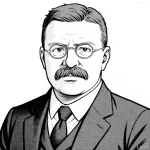“If civilization is to survive, we must cultivate the science of human relationships – the ability of all peoples, of all kinds, to live together, in the same world at peace.”

- January 30, 1882 – April 12, 1945
- American
- The 32nd President of the United States, Politician
table of contents
Quote
“If civilization is to survive, we must cultivate the science of human relationships – the ability of all peoples, of all kinds, to live together, in the same world at peace.”
Explanation
In this quote, Franklin D. Roosevelt emphasizes the critical need for understanding and cooperation between different peoples and cultures to ensure the survival of civilization. Roosevelt was speaking at a time when the world was recovering from the devastation of World War II, and tensions between nations were high. The statement reflects his belief that the future of humanity depends on effective communication, empathy, and collaboration across borders. The phrase “the science of human relationships” implies that this process requires deliberate effort and study, much like any other discipline.
Roosevelt understood that the complexities of international relations and human interactions required more than just good intentions; they needed structured approaches to diplomacy, education, and cultural exchange. By advocating for peace and mutual understanding, Roosevelt was not only addressing the immediate post-war environment but also setting the groundwork for long-term global cooperation, such as through the establishment of institutions like the United Nations. This belief in peaceful coexistence and dialogue was central to Roosevelt’s foreign policy.
In the context of today’s world, Roosevelt’s words remain profoundly relevant. The challenges of globalization, climate change, and international conflict underscore the necessity for cross-cultural understanding and diplomacy. Modern examples, such as the Paris Climate Agreement, show that cooperation between nations is key to addressing shared problems. Additionally, the rise of digital communication has brought people from diverse backgrounds closer together, reinforcing the importance of mutual respect and cultural sensitivity in maintaining peace and fostering sustainable relationships in an increasingly interconnected world.
Would you like to share your impressions or related stories about this quote in the comments section?




